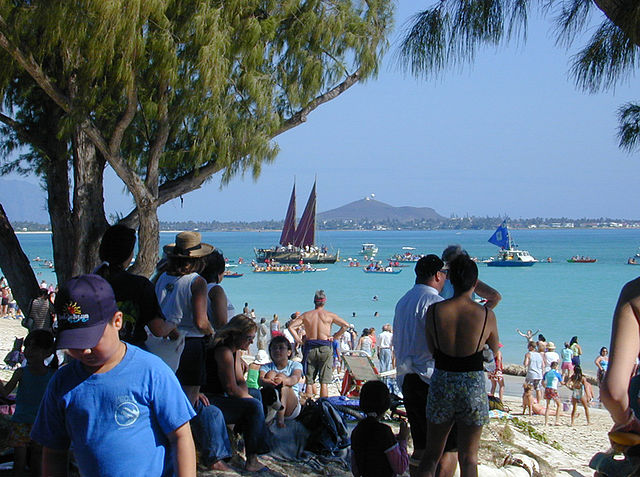Polynesian Voyaging Society
The Polynesian Voyaging Society (PVS) is a non-profit research and educational corporation based in Honolulu, Hawaiʻi. PVS was established to research and perpetuate traditional Polynesian voyaging methods. Using replicas of traditional double-hulled canoes, PVS undertakes voyages throughout Polynesia navigating without modern instruments.
The Hawaiian voyaging canoe, Hokuleʻa, arrives off Kailua Beach on May 1, 2005.
Hokuleʻa off the coast of Honolulu, January 2009
Polynesian navigation or Polynesian wayfinding was used for thousands of years to enable long voyages across thousands of kilometres of the open Pacific Ocean. Polynesians made contact with nearly every island within the vast Polynesian Triangle, using outrigger canoes or double-hulled canoes. The double-hulled canoes were two large hulls, equal in length, and lashed side by side. The space between the paralleled canoes allowed for storage of food, hunting materials, and nets when embarking on long voyages. Polynesian navigators used wayfinding techniques such as the navigation by the stars, and observations of birds, ocean swells, and wind patterns, and relied on a large body of knowledge from oral tradition. This island hopping was a solution to the scarcity of useful resources, such as food, wood, water, and available land, on the small islands in the Pacific Ocean. When an island’s required resources for human survival began to run low, the island's inhabitants used their maritime navigation skills and set sail for new islands. However, as an increasing number of islands in the South Pacific became occupied, and citizenship and national borders became of international importance, this was no longer possible. People thus became trapped on islands with the inability to support them.

Hōkūleʻa, A fibreglass hulled replica of a Hawaiian double-hulled canoe sailing off Honolulu, 2009
Hawaiian navigators sailing multi-hulled canoe, c. 1781
Marumaru Atua in Rarotonga, 2010.




